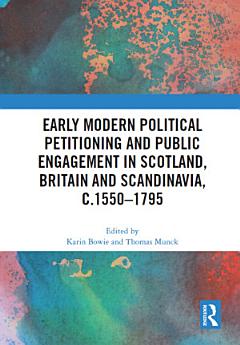Early Modern Political Petitioning and Public Engagement in Scotland, Britain and Scandinavia, c.1550-1795
About this ebook
A petition used to be a humble means of asking a favour, but in the early modern period, petitioning became more assertive and participative. This book shows how this contrasted to ordinary petitioning, often to the consternation of authorities. By evaluating petitioning practices in Scotland, England and Denmark, the book traces the boundaries between ordinary and adversarial petitioning and shows how non-elites could become involved in politics through petitioning. Also observed are the responses of authorities to participative petitions, including the suppression or forgetting of unwelcome petitions and consequent struggles to establish petitioning as a right rather than a privilege. Together the chapters in this book indicate the significance of collective petitioning in articulating early modern public opinion and shaping contemporary ideas about opinion at large.
The chapters in this book were originally published in the journal Parliaments, Estates & Representation.
About the author
Karin Bowie is Senior Lecturer in Scottish History at the University of Glasgow, UK. She studies the nature and impact of public opinion and participative politics in early modern Scotland and has a forthcoming monograph on Public Opinion in Early Modern Scotland, c.1560-1707.
Thomas Munck is Professor of Early Modern European History at the University of Glasgow, UK, where his research has focused on comparative European social, cultural and political history. He co-chairs an international seminar on Cultural Translation and his book Conflict and Enlightenment: Print and Political Culture in Europe 1635-1795 was published in 2019.




